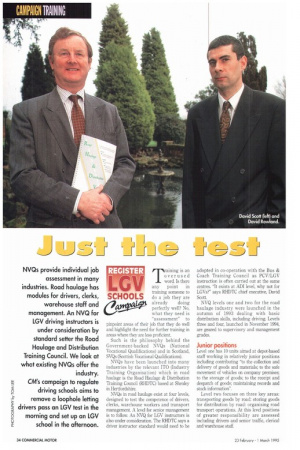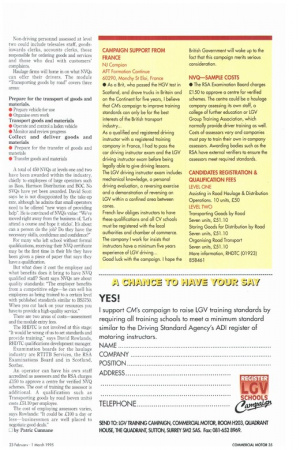SCHOOLS
Page 36

Page 37

If you've noticed an error in this article please click here to report it so we can fix it.
Tratning is an overused word. Is there any point in training someone to do a job they are already doing perfectly well? No, what they need is "assessment" to
pinpoint areas of their job that they do well
and highlight the need for further training in
areas where they are less proficient. Such is the philosophy behind the Government-backed NVQs (National Vocational Qualifications) and in Scotland, SVQs (Scottish Vocational Qualifications).
NVQs have been launched into many industries by the relevant ITO (Industry Training Organisation) which in road haulage is the Road Haulage Sz Distribution Training Council (RHDTC) based at Shenley in Hertfordshire.
NVQs in road haulage exist at four levels, designed to test the competence of drivers, clerks, warehouse workers and transport management. A level for senior management is to follow. An NVQ for LGV instructors is also under consideration. The RHDTC says a driver instructor standard would need to be adopted in co-operation with the Bus Sz Coach Training Council as PCV/LGV instruction is often carried out at the same centres. "It exists at ADI level, why not for LGlis?" says RHDTC chief executive, David Scott.
NVQ levels one and two for the road haulage industry were launched in the autumn of 1993 dealing with basic distribution skills, including driving. Levels three and four, launched in November 1994, are geared to supervisory and management grades.
Junior positions Level one has 10 units aimed at depot-based staff working in relatively junior positions including contributing "to the collection and delivery of goods and materials; to the safe movement of vehicles on company premises; to the storage of goods; to the receipt and despatch of goods; maintaining records and stock information".
Level two focuses on three key areas: transporting goods by road: storing goods for distribution by road: organising road transport operations. At this level positions of greater responsibility are assessed including drivers and senior traffic, clerical and warehouse staff.
Non-driving personnel assessed at level I two could include telesales staff, goodsinwards clerks, accounts clerks, those responsible for ordering goods and services and those who deal with customers' complaints.
Haulage firms will home in on what NVQs can offer their drivers. The module "Transporting goods by road" covers three areas:
Prepare for the transport of goods and materials.
• Prepare vehicle for use • Organise own work Transport goods and materials • Operate and control a laden vehicle • Monitor and review progress Collect and deliver goods and materials • Prepare for the transfer of goods and materials • Transfer goods and materials A total of 450 NVQs at levels one and two have been awarded within the industry, chiefly to employees of large operators such as Bass. Harrison Distribution and BOG. No SVQs have yet been awarded. David Scott says he is not disappointed by the take-up rate, although he admits that small operators need to be offered "new ways of providing help". He is convinced of NVQ's value: "We've moved right away from the business of, 'Let's attend a course and hope it sticks'. It's about can a person do the job? Do they have the necessary skills, confidence and confidence?"
For many who left school without formal qualifications, receiving their NVQ certificate may be the first time in their life they have been given a piece of paper that says they have a qualification.
But what does it cost the employer and what benefits does it bring to have NVQ qualified staff? Scott says NVQs are about quality standards: "The employer benefits from a competitive edge—he can sell his employees as being trained to a certain level with published standards similar to BS5750. When you cut back on your resources you have to provide a high-quality service."
There are two areas of costs—assessment and the module entry fees.
The RHDTC is not involved at this stage: "It would be wrong of us to set standards and provide training," says David Rowlands, RHDTC qualifications development manager.
Examination boards for the haulage industry are RTITB Services, the RSA Examinations Board and in Scotland, Scotbec.
An operator can have his own staff accredited as assessors and the RSA charges £150 to approve a centre for verified NVQ schemes. The cost of training the assessor is additional. A qualification such as Transporting goods by road (seven units) costs £51.10 per employee.
The cost of employing assessors varies, says Rowlands: "It could be .£100 a day or less—businessmen are well placed to negotiate good deals."
Li by Patric Ctmnane














































































































